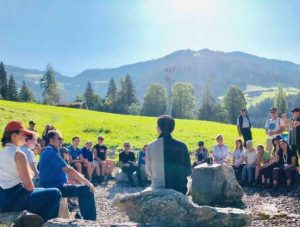Content warning: this article discusses the topic of suicide.

Welcome, dear readers, to another month of taking metta off the meditation cushion and out into the world.
Last month’s article, “Metta’s Three Courses,” dished up lessons from the kitchen of the Vipassana meditation center where I’m currently a long-term server. This month, a Dharmic detour took a very unexpected path.

Regular readers of this column may recall the dental drama described in last year’s “Metta’s Checkup.” The recent anniversary of crowning a cracked tooth and healing much maternal trauma found me visiting London for the day for another checkup. After the appointment, the autumn sun was shining so I decided to stroll through the city before catching my train back to the meditation center.
I followed my nose, revisiting old haunts and discovering new finds, unexpectedly enjoying the city’s hustle and bustle after two months of group sits and noble silence. Although I had planned to stay north of the River Thames, I felt an unexpected nudge passing through Covent Garden to detour south across Waterloo Bridge—my favorite of London’s bridges for its views, especially at sunset.

Halfway across, I noticed a young woman in her early twenties sitting on the railing. She was simply staring at the water rolling past below, gently rocking herself back and forth. My first thought was that perhaps she was posing for a photo, but when I looked around there was no photographer in sight.
One concerned-looking woman stood a few feet further along the railing while everyone else continued to rush past. I caught her eye, and quietly asked if she knew the young woman on the railing. She shook her head and asked me if I had a phone on hand. I shook my head in turn, and quietly caught the attention of a man passing using his. He took in the scene at a glance and walked out of earshot to call emergency services, while I silently took a place along the railing too.
The rush-hour crowds and tourists bustled past, for the most part oblivious to what was potentially about to happen. The few who looked up silently took their places either side of the young woman who was still rocking back and forth and now crying. Within minutes, there were at least 10 people on either side of her, all quietly looking at the river none of us daring to say anything that might tip her over the actual edge.
Dear readers, I confess that in all my years of experimenting with generating metta, I have never done so with such laser focus as in that moment. I genuinely didn’t know what else to do except hold onto the railing and hold a space, asking myself whether I felt I was a strong enough swimmer to jump in after her if needed.

Before I could start unzipping my jacket, a lifeboat already motored below us and a helicopter hovered above us.
No one moved.
And then I felt someone new approach and nudge me back. The woman clearly wasn’t the police or emergency services, just a passerby who began speaking loudly enough to be heard above the bustle. She voiced what we were all no doubt thinking and feeling:
“Please. Do. Not. Do. This.”
That got the young woman’s attention enough to stop rocking. The woman continued:
“Both my mother and younger brother killed themselves, and not a day goes by that I don’t wish I could’ve said to them what I’m about to tell you now.
“You are so needed in this world.
“It may not feel that way today, but you are. We—all these people standing along this railing holding space for you—want to help you, want you to live, want the gift you are to stay.”
By this point, all of us were in tears and even the police officers that had arrived by car held back.
As the woman continued to speak, the man who had placed the emergency call ever-so-gently approached the young woman from behind and slid his left arm around her waist as if inviting her to dance. She stilled enough to let him tip her backward, then he and two others caught her before she hit the pavement.

Meanwhile, the woman who had first spoken collapsed back into my arms. I held her as she turned to bury her face in my shoulder and sob. “Did I do the right thing?” she asked. “She didn’t jump, did she? I had no idea what I was saying. I was just walking past and the words flew out of me.”
I stroked her back, whispering reassurances that she’d found the perfect words—probably better than any of the emergency responders could have. As I rocked her in my arms until she settled, childhood memories of my own flooded back from all the years of talking my mentally ill mother down off inner ledges. While I wouldn’t wish that responsibility on any child, it connected dots as to why as an adult I’m able to stay so calm in a crisis. But perhaps it was also time to fully surrender the misplaced sense of responsibility from childhood and the maternal trauma exposed by last year’s cracked tooth to metta’s circle of care?
Looking around, I spotted the dozens of strangers who had silently gathered to hold onto the railing and hold a space also wiping their own eyes in relief, confiding in each other that they’d never prayed so hard in their lives to any and every imaginable deity.
By the time the woman I was comforting felt steady enough to stand on her own, the young woman whose desperation had set this whole scene in motion was already safely wrapped in a blanket in the back of the police car. I asked the woman I was cradling whether she needed any support with her onward journey, and she replied no with a smile and thanked me for finding the words that she needed to hear.
Minutes later, the sun set and all those involved dispersed. Both life and the River Thames kept rolling.
I like to think that the young woman left us all the gift of remembering that none of us are alone in this world, and that none of us have to figure anything out alone in this world. Ultimately, all any one of us can do, from moment to moment, is hold a space for metta to draw its circle of care and welcome help of all sorts.

Usually, I would metta-morphose the lyrics to the obvious song for this tale—the unofficial anthem for London, “Waterloo Sunset” by the Kinks. Instead, I’ll share a quote from an interview in Daniel Rachel’s book The Art of Noise: Conversations with Great Songwriters (p. 1,895), in which Ray Davies of the Kinks recalls singer Jackson Browne’s response to a particular lyric from “Waterloo Sunset”:
He said, “I don’t need no friends?” He said it twice. I said, “Yeah.” He said, “That’s the most beautiful thing I’ve ever had to sing. It doesn’t make sense on the page but when you put it with the music . . .”
I hadn’t thought about it that way. The melody takes the curse off the grammar fault. The choice of words, the way they’re pronounced, sometimes gives an emotion that’s unexpected. Don’t is the killer word because it’s not correct. Great lines are only great because of what precedes them, maybe sometimes when they happen after.
Related features from BDG
Life is Precious: Buddhist Measures in Suicide Prevention
Exercise Your Right to Lead a Happy Life
Book Review: The Buddhist and the Ethicist: Conversations on Effective Altruism, Engaged Buddhism, and How to Build a Better World
Metta’s Tent Revival












